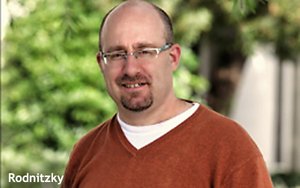Commentary
3Q Digital's Rodnitzky: Search Tips On Fragmentation
- by Laurie Sullivan , Staff Writer @lauriesullivan, September 12, 2016
 Fragmentation is the biggest change and challenge in marketing today, according to David Rodnitzky, CEO at 3Q Digital, a Harte
Hanks company. Consumers use multiple devices, dividing their time between social networks, apps, search, and video. He says brands should expect an increasing amount of fragmentation through
connected cars, smart TVs, virtual reality and augmented reality.
Fragmentation is the biggest change and challenge in marketing today, according to David Rodnitzky, CEO at 3Q Digital, a Harte
Hanks company. Consumers use multiple devices, dividing their time between social networks, apps, search, and video. He says brands should expect an increasing amount of fragmentation through
connected cars, smart TVs, virtual reality and augmented reality.
Marketers can expect to wake up every morning with more channels, more devices, and more data to sort through. For brands, the days of spending 90% of their online budget on search ending marketing or advertising and accounting for all of the results via last-click attribution are long gone.
So Search Blog asked Rodnitzky what the first step should be for advertisers to take to address this fragmentation. Pointing to the self-help book -- Discover your strengths! -- he suggests that advertisers need to look in the mirror and assess their strengths and realize what they can't, won't, and don't know how to do. He says that creates a framework for investment to determine what the company should take in-house or assign to an agency, as well as the type of technology required to get the job done.
Search Blog: Many advertisers are not paying attention to the mounds of data that will become available to them through IoT devices. They tell me it's too soon. How will the emergence of IoT devices change this or force advertisers to rethink strategies?
Rodnitzky: I think it just reinforces the need for analytics and machine learning. Advertisers have a hard enough time crunching their data from Google Analytics, AdWords, and Facebook. Now add IoT, connected cars, and in-store beacons into the mix and the idea that we can just get really good at Excel to get a true understanding of our customers becomes specious. So I think we are going to start seeing advertisers build decision sciences teams that combine analytics, attribution, data management, and data mining.
SB: Are you concerned for those advertisers that are not paying attention to the data?
DR: Absolutely. I call this information asymmetry. If I know that men buy 50% more shampoo between 12 a.m. and 5 a.m. while surfing an Android device and you don't, I'll increase my bids at that time and outbid you and let you out-bid me for inferior audiences. You'll be scratching your head as to how I am able to profit from a given keyword or display placement, but because I have better data, I'm effectively taking all the great traffic and giving you all the "crap" traffic, as my British counterparts would say.
SB: When you wake at 2 a.m. and cannot get back to sleep, what type of customer experience or advertising strategy are you thinking about as it relates to search, fragmentation, data and IoT?
DR: I think a lot about how digital marketers will one day disrupt traditional advertising, like TV, radio, direct mail, and out-of-home. I think we are nearing that point where all media is programmatic and addressable. That will be a fun time for digital marketers, but perhaps not as fun for the big agencies that have had a lock on traditional marketing.
SB: What type of attribution model should advertisers think about?
DR: Not last-click. Seriously, however, the blessing and the curse of attribution is that it has made us realize that there is something better than last-click, but it has added so much uncertainty into the accuracy of our data. Because there are so many attribution models now, it's really hard to know if we're using the right one. So I think the best thing we can do is to continually test new models, feed in new data points, and try to get better. There isn't one model that is the heir apparent right now.
SB: What is the best piece of career advice you ever received?
DR: There are two: first, you don't get what you deserve, you get what you negotiate. Second, the California Lotto ran an ad that said: "Somebody's gonna lotto, might as well be you." I think that applies to work too -- why not you?
SB: Any other pieces of advice do you want to give advertisers?
SB: What is the future of search advertising? How do you see your role as working at an agency to support brand clients evolving as search evolves?
DR: A few months ago I wrote a controversial article stating that search engine marketing agency was dying. My basic premise is that SEM by itself is becoming a commodity, which means that clients will either bring it in-house or choose a low-cost solution. To continue to provide value to clients, agencies need to address the fragmentation we talked about earlier -- they need to service multiple channels and offer non-media buying solutions that strengthen media buys such as CRO, analytics, strategy, etc.
My agency is in stage two of a three-stage evolution: from SEM agency to digital performance marketing agency, to performance marketing agency. In other words, I think we'll someday offer offline and online media buying plus any ancillary service that drives ROI for clients. We will be agnostic to channel or service -- we'll just ferret out the best ROI anywhere we can find it.



